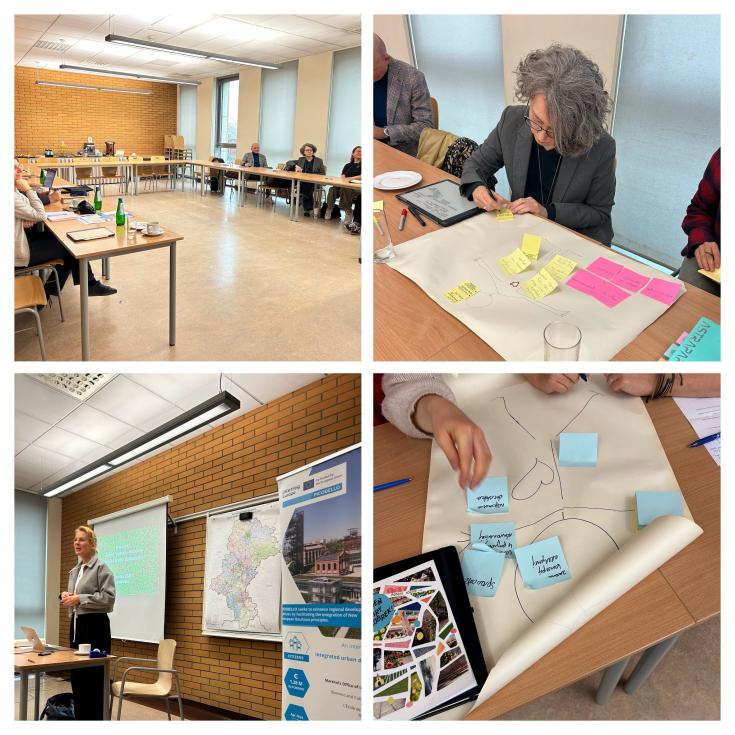Green Spaces and Well-being: Workshop Insights

Greenery and Well-being: A Workshop on Nature’s Role in Regional Policy
On March 27, 2025, a workshop was held as part of the Picobello Interreg Europe project to explore how green spaces and nature contribute to improving well-being in urban and post-industrial regions. With a focus on the New European Bauhaus (NEB) values of sustainability, beauty, and inclusivity, the workshop brought together experts from various sectors, including urban planning, ecology, education, and community development, to discuss the potential of green spaces as a tool for regional transformation.
The Green Potential of Post-Industrial Spaces
The workshop highlighted the often-overlooked green spaces within industrial and urban areas. Despite the region’s strong industrial heritage, it was revealed that there are numerous pockets of nature—both natural and revitalized—that can offer residents much-needed relief and benefits. Participants pointed out that these spaces are not only places for relaxation but also important for physical and mental health, helping to reduce stress and enhance overall well-being.
The Role of Nature in Enhancing Well-being
Scientific studies have long demonstrated the positive effects of nature on health—reducing stress levels, improving concentration, and supporting emotional well-being. At the workshop, participants emphasized that nature is not merely an aesthetic feature, but an essential aspect of life. The presence of greenery is therapeutic, offering both physical and psychological benefits, especially in urban environments. Being surrounded by trees, walking on natural surfaces, or simply pausing to enjoy a moment of stillness in a park can provide a sense of peace and connection to the environment.
Building Emotional and Social Connections
The conversation also touched on the emotional and identity-based connections that people have with green spaces. For many residents, caring for local green areas or spending time in familiar natural settings strengthens their sense of belonging and responsibility towards the region. It became clear that green spaces are more than just environmental features—they are integral to shaping the social fabric of the region and fostering a sense of community.
Challenges in Promoting Green Spaces
While the region boasts a variety of green areas, participants identified a significant challenge: the lack of visibility and promotion of these spaces. Many of the green resources available to residents are not adequately integrated into public policy or regional strategies. This means that people may not fully appreciate the benefits of nearby parks, gardens, or green corridors. The need for a comprehensive educational and informational campaign was emphasized, one that would highlight the importance of these spaces and raise awareness about their positive impact on well-being.
From Diagnosis to Solutions
The workshop was not only a forum for identifying challenges but also for generating ideas. Participants brainstormed a range of solutions to better incorporate green spaces into the region’s social and cultural life. One of the key recommendations was to create campaigns that promote the ecological and social benefits of nature, targeting different groups within the community. This could include initiatives to encourage people to spend more time in nature, organize community events in green spaces, or offer workshops and educational programs that connect people to their environment.
Additionally, there was a call for stronger support for grassroots initiatives and local projects that focus on nature conservation and green space revitalization. By providing funding, mentoring, and community resources, the region could empower local leaders and citizens to actively contribute to the creation and care of green spaces.
Creating a Cohesive Regional Vision
The discussion also touched on the importance of creating a cohesive regional strategy that integrates green spaces into broader development plans. Participants stressed that regional policy should reflect the New European Bauhaus principles by ensuring that green spaces are not only functional but also aesthetically appealing and accessible to all. This would not only improve the quality of life for residents but also contribute to the region’s long-term sustainability and resilience.
The workshop concluded with a shared commitment to integrating green spaces more deeply into the region’s development agenda. Participants agreed that these spaces are vital to the well-being of residents and should be treated as key assets in the region’s ongoing transformation. By creating a strong narrative around the value of nature and supporting local efforts to protect and enhance green areas, the region can create a future where green spaces are a central part of life, contributing to both individual and collective well-being.
